- Author Matthew Elmers elmers@military-review.com.
- Public 2023-12-16 21:49.
- Last modified 2025-06-01 06:23.
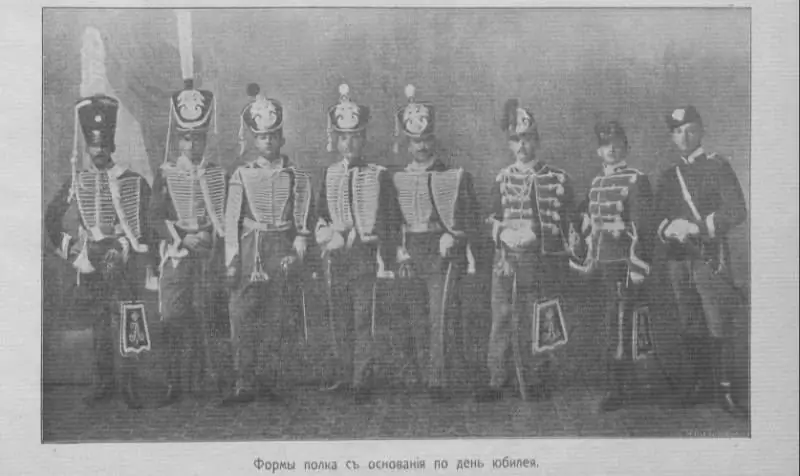
And everything began as typical for the Lubents, as well as for many other regiments of the Russian army.
In 1807, the country was already at war with Napoleon, and this war required many new units, one of which was the hussar regiment, formed according to the state of 1802 in the Mogilev province.
Why Lubensky?
There were plans after the formation to place the regiment in Lubny, Poltava province. The regiment had nothing to do with Little Russia or Lubny at the time of formation. The core of the regiment was 240 cavalry guards, the recruitment of people proceeded quickly. And by October 1, 1807, in just six months, the regiment was formed.
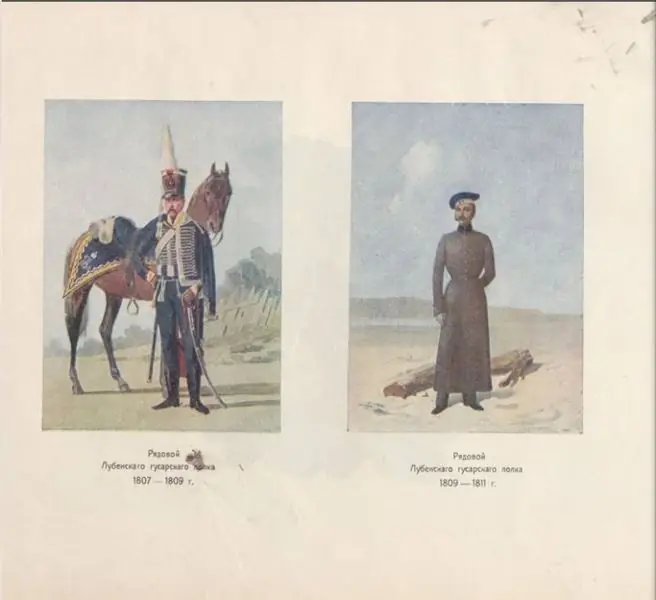
Then there was a study already in the place of permanent deployment - Lubny, later in Gadyach, as part of the 9th division.
First war
In 1810-1811, the regiment was in the Crimea and guarded the coast during the Turkish campaign, not taking part in hostilities. And already in 1812 he joined the battle as part of the 2nd Cavalry Division of the 3rd Army of Tormasov.
This army is known much less than others, it was located in Volhynia and covered Little Russia, finding itself on the sidelines of the main events. Its opponents were the Rainier Saxons, numbering 17,000. The regiment entered the battle on July 9, and it has the first cannon captured from Napoleon's troops.
Then there was a campaign to the north, battles in Belarus, a retreat to Volyn, an autumn campaign to Brest and Bialystok … In 1813, the regiment took part in a foreign campaign and the Battle of the Nations, having lost its commander in battle.
The regiment ended the war in France, having lost 558 people in battles and skirmishes.
Second war
The second campaign of the regiment was the Polish one in 1830.
There were no special events during it, and the war itself was largely routine: the Poles were driven to Warsaw. And the main enemy of the Russian army was, rather, cholera, from which the Lubenets lost more people than from the fighting. There were also unpleasant cases - for example, the regimental doctor went over to the side of the Poles.
As a result, the regiment traditionally ended the war in the enemy capital. After the war, the Lubents were in Poland, where a division of the disbanded Irkutsk regiment was enlisted in their composition.
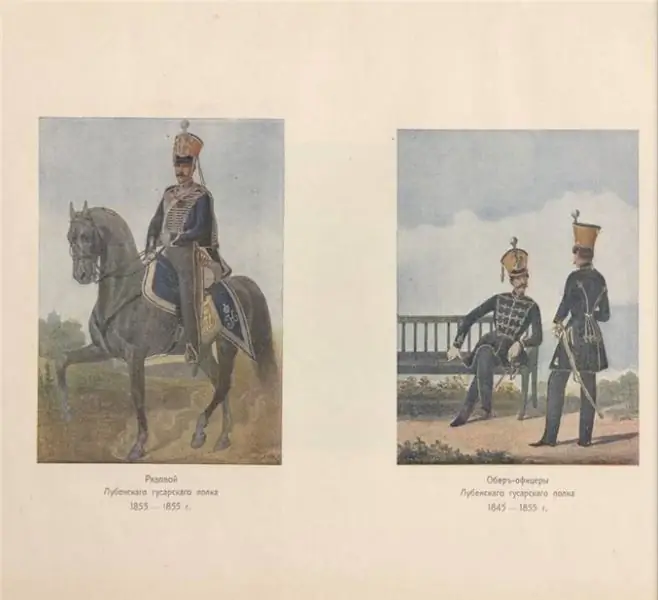
Third war
The regiment entered the third war in 1849 against the Hungarians.
And again the regiment showed itself brilliantly: after suffering modest losses (mainly from cholera), it returned to Poland a few months later.
Further, for a long time, the regiment's service proceeded peacefully, apart from the quite usual officer conflicts for that time.
In the Crimean War, the regiment became part of the Western Army and again covered Volhynia, not taking part in hostilities. Places of deployment alternated until the regiment settled in Chisinau in 1875. The commanders also changed, but the unit remained one of the most combat-ready in the Russian cavalry.
Fourth war
In 1877, the fourth war of the regiment began - the Russian-Turkish.
Under the command of Colonel Borozdin, the Lubents, as part of the 8th Cavalry Division, moved to the front through the territory of Romania. There the regiment took part in the operation against the fortress Ruschuk, in the Sadinsky battle, entered the convoy of Tsarevich Alexander and participated in the Adrianople operation.
Thus, the regiment ended this war at the forefront, not far from Istanbul. In 1879 the regiment returned to Chisinau.
Punishers
But the next campaign of the regiment cannot cause admiration, after a quarter of a century of peace, the regiment did not get into the Japanese war, but managed to get into a punitive war: to suppress the revolution of 1905-1907.
And in this punitive operation, the hussars showed quite specific talents of arsonists and executioners.
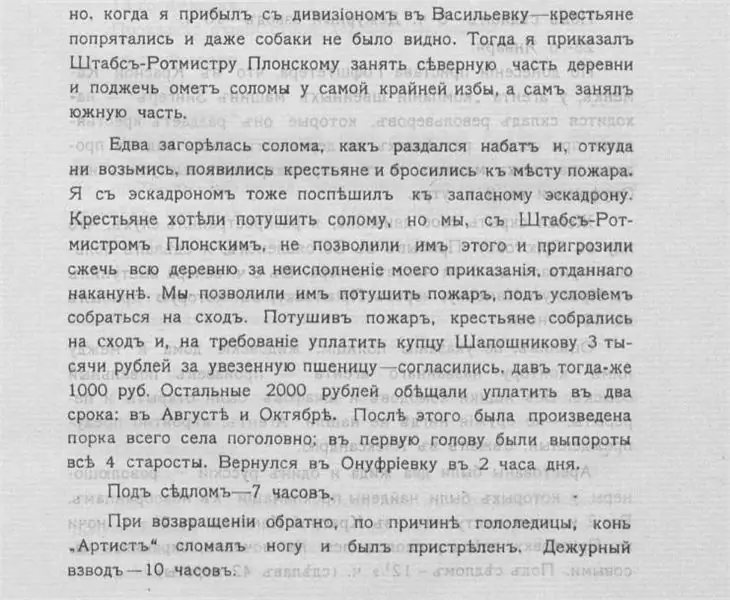
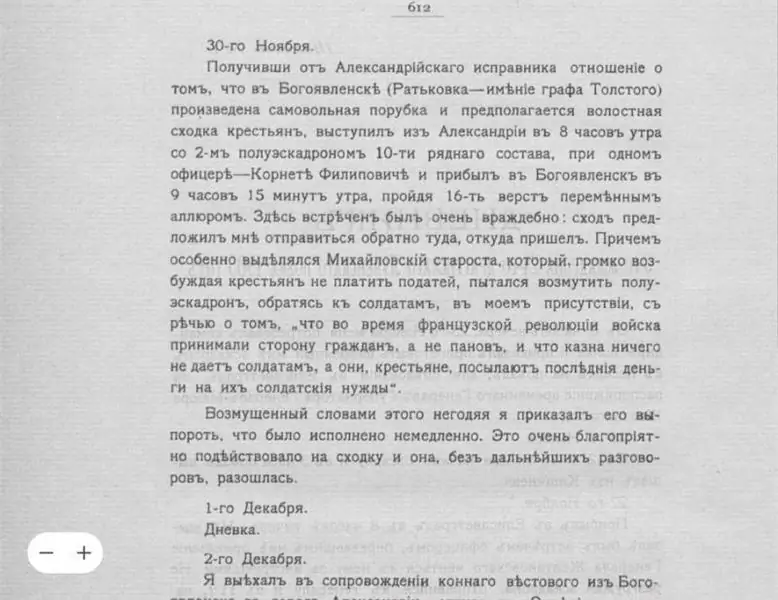
Set fire to the village to collect the gathering? Easily.
Flog the entire population? No problem.
To smash for the word against and impose tribute on the peasants? Easy.
In Yuzovka, cavalrymen cut down a crowd of striking workers - two killed, one hundred wounded, of which 24 were seriously wounded.
For these dubious "feats" the cavalrymen received silver medals for "diligence." Indeed, they acted diligently - in the Donbass alone, hussars killed three and wounded 153 workers.
It is with these events that the decline of the once glorious regiment begins: you cannot turn the army into punishers. Although I'm getting ahead of myself.
In 1907, the regiment celebrated its centenary, and a luxurious book was published about it. But further …
Then there was World War II, in which the regiment operated as part of the Southwestern Front, later the Romanian Front. Already in March 1917, the regiment was Ukrainianized, renamed the 2nd Lubensky Ukrainian Regiment (later Serdyutsky) under the command of the notorious Omelyanovich-Pavlenko, the future policeman of the Reich.
Traditions formed in 1907 have sprouted serious growth.
The lubents crushed the Russian red uprising of the Arsenal plant in Kiev, and fought with the Russian troops in the winter of 1917-1918. Then in 1919, however, they again went over to the Russians, to the White Army, where they were defeated by the Red Army.
And Omelyanovich-Pavlenko himself returned in 1941 as part of the Wehrmacht to head the Vinnitsa police (109th auxiliary police battalion), punished Belarusians and residents of Zhytomyr region, fled with the Germans in 1944, died in the USA. For punitive operations he was awarded the Order of the Reich, albeit a special one for the Untermens.
The story of the Lubents ended there.
Outcome
The once glorious regiment, which repeatedly defended its homeland from the enemy, since 1906 has become an ordinary punitive regiment. Karali Moldovans, residents of Kherson region and Donbass, Kiev residents, Russians of Little Russia.
As a result, the last commander of this regiment became a policeman and punished Jews, Ukrainians and Belarusians.
And the regiment also turned into perjurers: one by one it betrayed the emperor, the Provisional Government, the UPR. Well, just to their homeland, if we talk about the last commander of the regiment …
And we have received yet another proof - an army shooting at its own people becomes an occupying army, no matter what glorious traditions are behind it.






